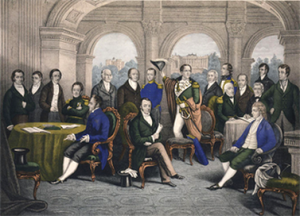Throughout the 18th century Catholics were seen as a threat that might rally in support of a Stuart attempt to regain the English throne. The government enforced a severe code of penal legislation against them. The Presbyterians also suffered religious disabilities but on a much lesser scale. Power was concentrated in the hands of the small Protestant ascendancy.
The American War of Independence had an important influence on Irish politics. The American example encouraged the Protestant ascendancy to press for a measure of colonial self-government. In 1782, the Irish parliament, hitherto subservient to London, was granted independence. Ireland was now effectively a separate kingdom sharing a monarch with England, but the Dublin administration was still appointed by the King. One of the leading figures in this parliament was Henry Grattan. From 1778 onwards the penal legislation against Catholics was gradually repealed. The parliament made moves to improve and liberalize trade.
The French Revolution, with its ideas of equality and liberty , had a major impact on Ireland. The Society of the United Irishmen was founded in 1791 to press for radical reform. Its members were mainly Presbyterians from the north. The leading figures were Wolfe Tone, Napper Tandy and Lord Edward Fitzgerald. The war with France led to severe military repression in Ireland. The United Irishmen rebelled in 1798, aiming to unite Catholics and Protestants, including Presbyterians, and to break Ireland’s link with England. In spite of French help the rebellion was badly organized and easily suppressed.
After the defeat of the rebellion, the London Government decided to unite the British and Irish parliaments. The Irish parliament, an unrepresentative assembly, was induced to vote itself out of existence in 1800.


